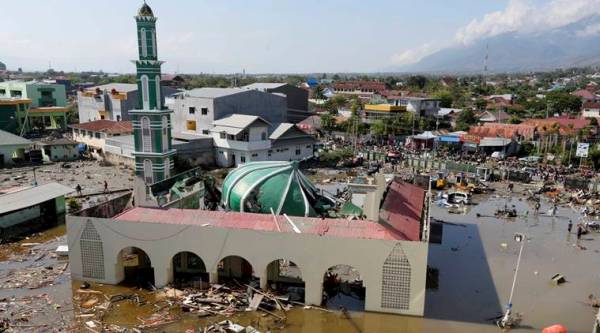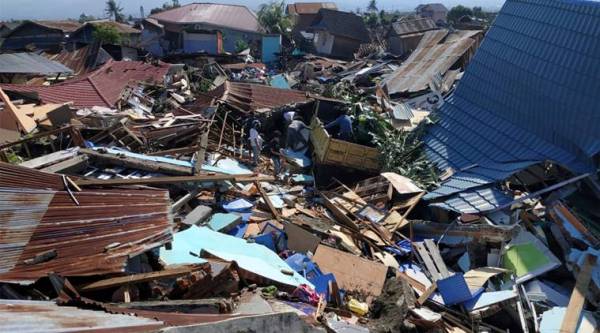 Indonesia tsunami LIVE UPDATES: A mosque damaged following earthquakes and tsunami in Palu, Central Sulawesi, Indonesia. (AP Photo/Tatan Syuflana/File)
Indonesia tsunami LIVE UPDATES: A mosque damaged following earthquakes and tsunami in Palu, Central Sulawesi, Indonesia. (AP Photo/Tatan Syuflana/File)
Indonesia is preparing a mass grave to bury its dead in the aftermath of the deadly 7.5-magnitude earthquake, which triggered a tsunami in Palu last week. For health and religious reasons, 300 bodies, which have been identified, will be initially buried. As death toll surged to 834 on Sunday, officials warned that it is likely to climb much higher. Most casualties are from Palu, as the situation in outlying areas like Donggala, Sigi and Parigi Moutong, is yet to be ascertained.
Indonesian President Joko Widodo, who visited the region over the weekend, said there are many challenges hampering rescue efforts. “We have to do many things soon, but the condition does not allow us to do so,” he was quoted as saying by The Associated Press. Palu has a population of 3,80,000 people, while the outlying areas comprise 1.2 million residents.
A 7.5-magnitude earthquake struck the coast of Sulawesi island on Friday evening, which is about 50 miles north of Palu. It triggered waves as high as six metres (20 feet), which bore down on the city destroying everything in its path and killing hundreds.
 People search through debris in a residential area following an earthquake and tsunami in Palu, Central Sulawesi, Indonesia. (Photo via Reuters)
People search through debris in a residential area following an earthquake and tsunami in Palu, Central Sulawesi, Indonesia. (Photo via Reuters)
More than 560 prisoners have escaped from Palu's prison after its walls caved in during the earthquake, reported Reuters. The warden was quoted by the agency as saying, "It was very hard for the guards to stop the inmates from running away as they were so panicked and had to save themselves too." In Donggala too, over a hundred inmates have reportedly fled.
According to Guardian, 1,425 prisoners are missing from jails.
Some key spots where rescue operations are underway, include Rao Rao Hotel, where at least 60 people are likely to be trapped and Tatura Mall. A woman was pulled out of the debris alive from the hotel on Sunday.
A victim is rescued from the ruins of the Roa-Roa Hotel (Photo via Reuters)
Rescue teams search for victims in the rubble of the Roa-Roa Hotel (AP Photo/Tatan Syuflana)
The government has declared a 14-day state of emergency in Sulawesi Island, which is one of Indonesia's five main islands. Majority of the population in the country, and on island, is Muslim with pockets of Christians. There are 3,80,000 people residing in Palu, which there are 1.2 million people in Donggala, Sigi and Parigi Moutong.
The death toll rose on Sunday to 834. Authorities are expected to provide an official update on the situation, including rescue efforts, shortly. Due to health and religious reasons, authorities are digging a mass grave in Palu which can hold 300 bodies. The bodies which have been identified will be buried "as soon as possible", the chief of the country's National Disaster Mitigation Agency said, reported AP. Most bodies have been recovered from Palu, as communication lines have been down hampering rescue efforts in outlying areas.
An earthquake measuring 7.5 on the Richter scale hit the Indonesian island of Sulawesi on the evening of September 28. The coast was hit by a tsunami around 30 minutes later. The Reuters map below shows the epicentre of the quake and the tsunami arrival lines. You can see how close Palu, among the most affected, is from the epicentre as well as the outlying areas of Donggala, Sigi and Parigi Moutong.
What is a tsunami?
A tsunami, also called a seismic sea wave, is a series of long, high waves caused by an earthquake or undersea volcanic eruptions. The speed and height of the waves depend on the depth of the ocean. They travel really fast and slow down only while reaching the coast.
A 7.5-magnitude earthquake struck the coast of Sulawesi Island in Indonesia on Friday morning, triggering a deadly tsunami. The toll crossed 800 in Sunday as authorities scrambled to search for survivors. Follow our live blog through the day as we bring you the latest news and updates.